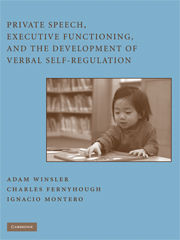
-
Select format
-
- Publisher:
- Cambridge University Press
- Publication date:
- July 2009
- April 2009
- ISBN:
- 9780511581533
- 9780521866071
- Dimensions:
- (228 x 152 mm)
- Weight & Pages:
- 1kg, 272 Pages
- Dimensions:
- Weight & Pages:
- Subjects:
- Developmental Psychology, Psychology, Cognition
You may already have access via personal or institutional login- Subjects:
- Developmental Psychology, Psychology, Cognition
Book description
Seventy-five years after Vygotsky's death, scholarship exploring developmental relations between language and thought continues to be strong. This edited volume compiles contributions from international leaders in the field on the roles of language and private speech (self-talk) in the development of self-regulation and executive functioning in children and adults. New theoretical insights, empirical research, and potential clinical and educational applications of scholarship on private speech are presented. Relevant for undergraduate and graduate students and scholars of psychology, education, linguistics, and cognitive science, this text will be an essential volume for those interested in the interface between language, cognition, and behaviour, and the development of regulatory or cognitive control over behaviour.
Reviews
“The first topic that caught my attention as a graduate student was the developmental relationship between language and thought. Although I didn't go on to make significant contributions to this literature, my fascination with the topic persisted. This edited volume by Adam Winsler, Charles Fernyhough, and Ignacio Montero brings together chapters by researchers who have examined different aspects of the connection between private speech and cognition, extending considerably the range of topics that behavioral scientists examined when I was in graduate school. The early chapters provide updated theoretical foundations for making sense of the chapters that follow, which provide a thorough review of what researchers know and believe about the developmental relation between language and thought. This will be an essential book for anyone interested in this important topic of cognitive developmental research.”
—David F. Bjorklund, Florida Atlantic University
“This is a wide-ranging collection of very stimulating, and at times, provocative, chapters on one of the central concepts of cultural-historical theory. It confirms many of Vygotsky’s original statements on private speech, while at the same time broadening and even challenging others. A welcome feature of the volume is the inclusion of research on adult private speech. At the same time, recognition of the growing body of research in applied linguistics on private speech in second language learners is especially satisfying.”
—James P. Lantolf, The Pennsylvania State University
“Previously marooned in something of a scholarly backwater, the study of private speech has now well and truly entered the mainstream with the publication of this expansive and integrative volume. Together the chapters convincingly demonstrate how the study of private speech is fundamental to our understanding not only of the relation between language and thought, but also of the organization of behavior during typical and atypical development. It is essential reading for all who are concerned with how language comes to regulate action through development.”
—Chris Moore, Dalhousie University, Canada
“This volume is a landmark in our contemporary research of private speech. The authors rely upon the seminal focus of Lev Vygotsky on the internalization of speech and combine it with our contemporary discourse about executive functions in human cognitive processes. By covering all the important fields of research currently present in the investigation of private speech – from neuroscience to creativity – the volume charts out new horizons for explaining how the internalized speaking operates within the developing mind over the whole of the human life course. The international cast of authors sets up a creative framework for new perspectives that should innovate the field towards a new focus of study on intra-psychological semiotic processes, and would transcend the currently fashionable large-samples based statistically flavored research practices in the direction of a new look at the legacies of Wilhelm von Humboldt, Gustav Shpet, and Charles Sanders Peirce.”
—Jaan Valsiner, Editor, Culture & Psychology and Integrative Psychological & Behavioral Science
Contents
Metrics
Altmetric attention score
Full text views
Full text views help Loading metrics...
Loading metrics...
* Views captured on Cambridge Core between #date#. This data will be updated every 24 hours.
Usage data cannot currently be displayed.
Accessibility standard: Unknown
Why this information is here
This section outlines the accessibility features of this content - including support for screen readers, full keyboard navigation and high-contrast display options. This may not be relevant for you.
Accessibility Information
Accessibility compliance for the PDF of this book is currently unknown and may be updated in the future.


